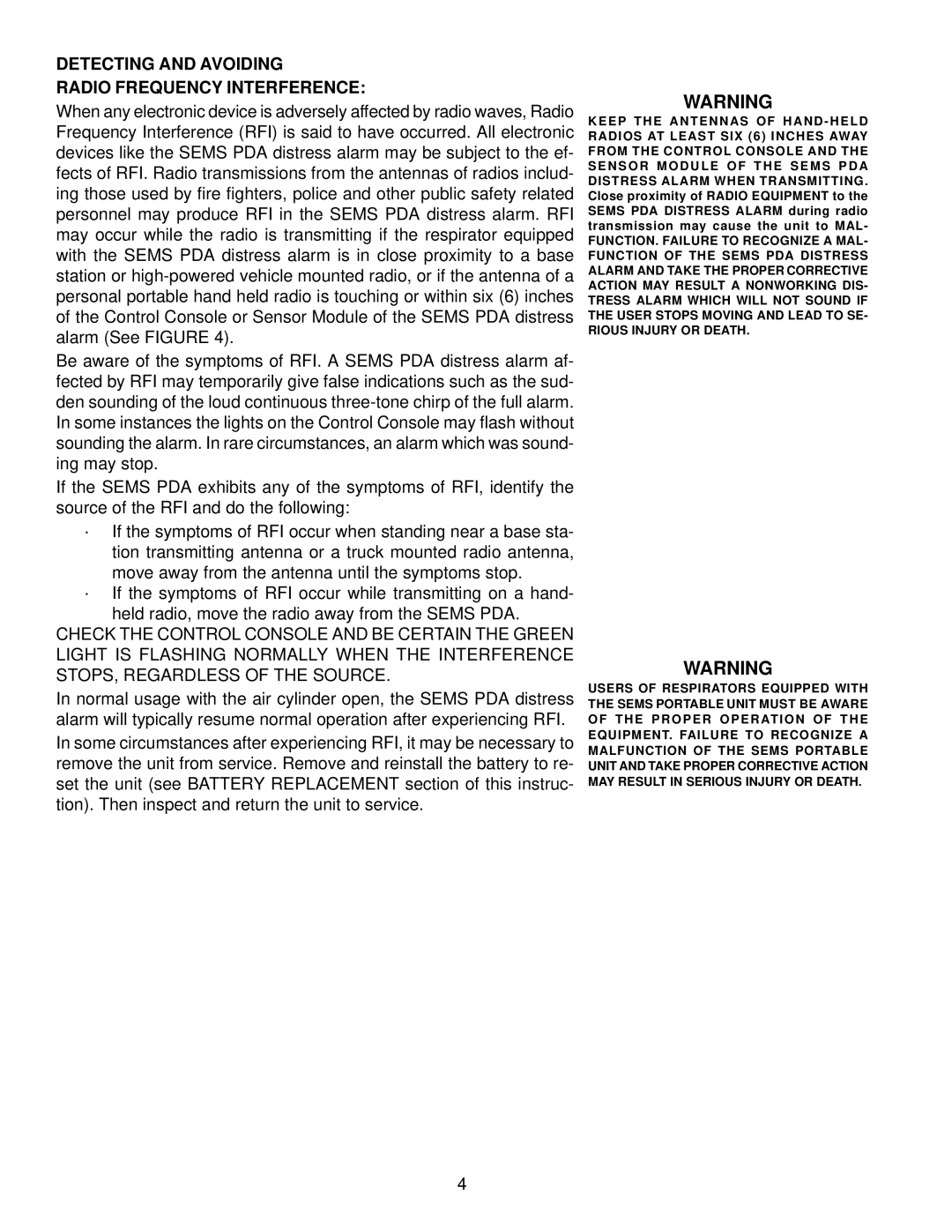DETECTING AND AVOIDING
RADIO FREQUENCY INTERFERENCE:
When any electronic device is adversely affected by radio waves, Radio Frequency Interference (RFI) is said to have occurred. All electronic devices like the SEMS PDA distress alarm may be subject to the ef- fects of RFI. Radio transmissions from the antennas of radios includ- ing those used by fire fighters, police and other public safety related personnel may produce RFI in the SEMS PDA distress alarm. RFI may occur while the radio is transmitting if the respirator equipped with the SEMS PDA distress alarm is in close proximity to a base station or
Be aware of the symptoms of RFI. A SEMS PDA distress alarm af- fected by RFI may temporarily give false indications such as the sud- den sounding of the loud continuous
If the SEMS PDA exhibits any of the symptoms of RFI, identify the source of the RFI and do the following:
·If the symptoms of RFI occur when standing near a base sta- tion transmitting antenna or a truck mounted radio antenna, move away from the antenna until the symptoms stop.
·If the symptoms of RFI occur while transmitting on a hand- held radio, move the radio away from the SEMS PDA.
CHECK THE CONTROL CONSOLE AND BE CERTAIN THE GREEN LIGHT IS FLASHING NORMALLY WHEN THE INTERFERENCE STOPS, REGARDLESS OF THE SOURCE.
In normal usage with the air cylinder open, the SEMS PDA distress alarm will typically resume normal operation after experiencing RFI. In some circumstances after experiencing RFI, it may be necessary to remove the unit from service. Remove and reinstall the battery to re- set the unit (see BATTERY REPLACEMENT section of this instruc- tion). Then inspect and return the unit to service.
WARNING
K E E P T H E A N T E N N A S O F H A N D - H E L D RADIOS AT LEAST SIX (6) INCHES AWAY FROM THE CONTROL CONSOLE AND THE S E N S O R M O D U L E O F T H E S E M S P D A DISTRESS ALARM WHEN TRANSMITTING. Close proximity of RADIO EQUIPMENT to the SEMS PDA DISTRESS ALARM during radio transmission may cause the unit to MAL-
FUNCTION. FAILURE TO RECOGNIZE A MAL- FUNCTION OF THE SEMS PDA DISTRESS ALARM AND TAKE THE PROPER CORRECTIVE ACTION MAY RESULT A NONWORKING DIS- TRESS ALARM WHICH WILL NOT SOUND IF THE USER STOPS MOVING AND LEAD TO SE- RIOUS INJURY OR DEATH.
WARNING
USERS OF RESPIRATORS EQUIPPED WITH THE SEMS PORTABLE UNIT MUST BE AWARE O F T H E P R O P E R O P E R AT I O N O F T H E EQUIPMENT. FAILURE TO RECOGNIZE A MALFUNCTION OF THE SEMS PORTABLE UNIT AND TAKE PROPER CORRECTIVE ACTION MAY RESULT IN SERIOUS INJURY OR DEATH.
4
